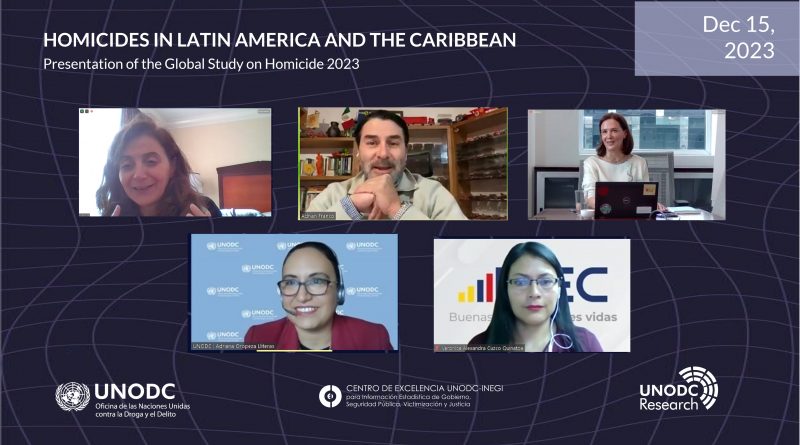Webinar: Homicides in Latin America and the Caribbean, presenting the Global Study on Homicide 2023
Watch the webinar in different languages
- Spanish: https://youtu.be/z5na6UUmoQw
- English: https://youtu.be/Aewfxpoz8yI
- French: https://youtu.be/0-Mbb8EXk1I
- Portuguese: https://youtu.be/A3E_t7Ik6gk
The UNODC-INEGI Center of Excellence for Government, Public Security, Victimization and Justice Statistical Information organized the webinar “Homicides in Latin America and the Caribbean” on December 15, 2023, in the context of the recent publication of the 2023 Global Homicide Study (GHS). The event was attended by the statistical offices of Argentina, Bolivia, Colombia, Chile, Mexico, the Dominican Republic, and Venezuela, as well as the Ministries of the Interior, Foreign Affairs, Security, and Defense of Argentina, Costa Rica, Granada, Paraguay, Peru, Suriname, and Uruguay; the General Prosecutor’s Offices of Bolivia; institutions related to the administration of justice, the guarantee of human rights, the advancement of gender equality, and the prison systems of Anguilla, the Bahamas, Honduras, Mexico, Venezuela, and Brazil; the Department of Public Security of the Organization of American States; subnational representatives responsible for public security functions in Argentina, Chile, and Mexico; civil society organizations; representatives of private companies from sectors such as energy and food; and various academic and research institutions from Europe, Africa, and Central Asia. In this instance, the event also featured the participation of institutions from Germany, Cameroon, Pakistan, and Uzbekistan, among other countries.
Ms. Adriana Oropeza, coordinator of the Center of Excellence, began the webinar commenting on the importance of having this global study and highlighting the availability of statistics on Latin American countries that allow the identification of trends and patterns in the continent, and the characterizations of different components at a subregional level.
The webinar’s main objective was to present the results of the Global Homicide Study with a focus on Latin America and the Caribbean. To this end, Ms. Angela Me, Head of the UNODC Research Subdivision, followed the conversation providing a strategic and detailed perspective on the level of intentional homicides, mentioned the population groups that suffer these crimes, and how components like mechanisms, the socio-political situation, organized crime, firearms, and high impunity rates influence this problem. See presentation.
Subsequently, Nathalie Alvarado, Sectoral Technical Leader at the Inter-American Development Bank (IDB), highlighted the value of the Global Homicide Study as a source of information and its usefulness for designing the IDB’s activities in Latin America and the Caribbean. She spoke about the importance of characterizing homicides, their granularity, and the need to count them at the regional, national, and local levels. How, from knowing the number of victims, impunity in the region can be reduced, and mentioned the need to create and improve measurement instruments to have reliable data that are accessible to everyone that effectively address this phenomenon.
Ms. Verónica Cuzco, responsible for Security, Justice, and Crime Statistics at the National Institute of Statistics and Censuses of Ecuador (INEC), presented Ecuador’s national experience in collecting, processing, analyzing, and disseminating data to measure both homicides and femicides, with a disaggregated measurement that includes data such as: the mechanisms used, place of occurrence, characteristics of the victim, of the aggressor, among others.
Adrián Franco, Vice President of the Board of Directors and President of the National Institute of Statistics and Geography (INEGI) and Coordinator of the Police Statistics Working Group, shared the results obtained in terms of statistics on prison systems and described the activities that will be carried out to develop a Reference Guide on police administrative records based on the guidelines published by UNODC. Finally, he highlighted the importance of using other databases and information programs that can complement and strength statistics on homicides, such as victimization surveys and the statistical exploitation of injuries recorded in health institutions, emergency response system calls, etc.
The 2023 Global GHS Study, the results for Latin America and the Caribbean, and the participation of the people who attended the webinar, will allow for the development of a series of activities to: disseminate subregional results, strengthen the statistical capacities of the region, and support the design of interventions to prevent homicides and support the processes of prosecution and administration of justice.
Consult the 2023 Global Homicide Study at: http://internet.contenidos.inegi.org.mx/contenidos/unodc/doc/info/2023/GlobalStudyOnHomicide_2023_ENG.pdf
Watch the webinar: https://youtu.be/Aewfxpoz8yI



